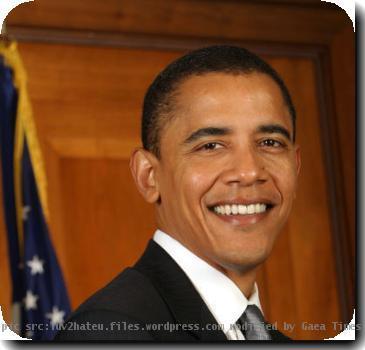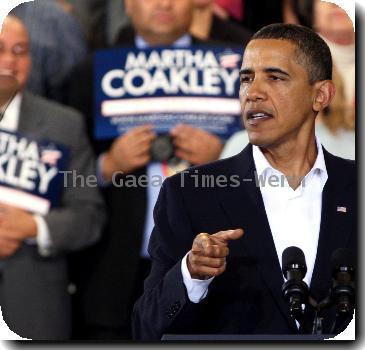AP-Univision poll: Obama’s once solid support among Hispanics shows a few cracks
By Liz Sidoti, APTuesday, July 27, 2010
Poll: A few cracks in Obama’s Hispanic support
WASHINGTON — President Barack Obama’s once solid support among Hispanics is showing a few cracks, a troubling sign for Democrats desperate to get this critical constituency excited about helping the party hold onto Congress this fall.
Hispanics still overwhelmingly favor the Democratic Party over the GOP, and a majority still think Obama is doing a good job, according to an Associated Press-Univision poll of more than 1,500 Hispanics.
But the survey, also sponsored by The Nielsen Company and Stanford University, shows Obama gets only lukewarm ratings on issues important to Hispanics — and that could bode poorly for the president and his party.
For a group that supported Obama so heavily in 2008 and in his first year in office, only 43 percent of Hispanics surveyed said Obama is adequately addressing their needs, with the economy a major concern. Another 32 percent were uncertain, while 21 percent said he’d done a poor job.
That’s somewhat understandable, given that far more Hispanics have faced job losses and financial stress than the U.S. population in general.
An unfulfilled promise to overhaul the nation’s patchwork immigration system, which most Hispanics want to see fixed, also may be to blame. That’s despite the fact that Obama is challenging an Arizona law that requires police, while enforcing other laws, to question a person’s immigration status if officers have a reasonable suspicion he or she is in the country illegally.
Still, 57 percent of Hispanics approve of the president’s overall job performance compared with 44 percent among the general population in the latest AP national polling.
“It’s been tough, but I think he’s been doing a fair job,” says Tony Marte, 33, a physical education teacher in Miami who is a Nicaraguan native. He voted for Obama in 2008 and, so far, likes how Obama has handled the economy.
But Marte’s not satisfied with Obama’s work on immigration reform. “Nothing has been done,” he says, adding that between now and 2012, Obama should “be looking out for the groups that put him up there. The Latinos. The minorities.” He says he’ll probably back Obama again but “we’ll see.”
The political power of Hispanics now and in the future cannot be overstated. They are the nation’s fastest-growing minority group and the government projects they will account for 30 percent of the population by 2050, doubling in size from today.
Democrats long have had an advantage among Hispanics and maintained it even as George W. Bush chipped away at that support. Obama erased the GOP inroads during his 2008 campaign, winning 67 percent of their vote to 31 percent for Republican nominee John McCain. And Hispanics consistently gave Obama exceptionally strong marks in his first year as president.
With the first midterm congressional elections of Obama’s presidency in three months, the poll shows a whopping 50 percent of Hispanics citizens call themselves Democrats, while just 15 percent say they are Republicans.
Among Hispanics, 42 percent rate the economy and the recession as the country’s biggest problem; unemployment and a lack of jobs come in at 23 percent.
Ascencion Menjivar, a Honduran native who is a cook in Washington, isn’t sold on the administration’s approach to creating jobs and is waiting for a solution to get the economy back on track. “I think it’ll be a long process,” says Menjivar, 30. Still, he says Obama — “a genius” — eventually will make it happen.
Patricia Hernandez Blanco of Miami, 38, is less confident that recovery is under way. “I’m not sure it’s improving,” she says. Even so, this Cuban who voted for McCain says she would now cast a ballot for Obama.
Re-electing Obama would be “really stupid,” counters Carlos Toledo of Puerto Rico, an independent voter, clothing store manager and self-defense instructor in Washington. Toledo, 35, disagrees with Obama’s economic policies and says he worries about joblessness as budgets are cut and money is spent on wars despite the country’s debt.
Behind economic woes, immigration comes in second in importance.
Since the controversy over the Arizona law erupted in April, Hispanics who mostly speak English at home gave Obama higher marks on his handling of their top issues than did Hispanics who primarily speak Spanish and who tend to be more recent immigrants or non-citizens.
Analysts say it’s possible that the more English-dominant Hispanics rallied around the president following the enactment of the Arizona law and his challenge to it; some 40 percent of them approved of his performance on their key issues before Arizona Gov. Jan Brewer signed the law in April, but the figure rose to 52 percent in the weeks after.
On Monday, Brewer asked a judge to throw out the U.S. Justice Department’s challenge.
The poll also showed that two years after witnessing Hillary Rodham Clinton’s White House bid, Hispanics are twice as likely to expect to see a woman than a fellow Hispanic become president.
Some 59 percent said it is likely that a woman will be elected president sometime in the next two decades, while just 29 percent thought it likely that a Hispanic will be elected president over that period. And, 34 percent of non-citizen Hispanics thought the country is likely to have a Hispanic president, compared with 27 percent of citizens.
A significant percentage of Latinos — 41 percent — said they are more likely to vote for a candidate who is Hispanic.
The AP-Univision Poll was conducted from March 11 to June 3 by the National Opinion Research Center at the University of Chicago. Using a sample of Hispanic households provided by The Nielsen Company, 1,521 Hispanics were interviewed in English and Spanish, mostly by mail but also by telephone and the Internet. The margin of sampling error is plus or minus 3.5 percentage points.
Stanford University’s participation in the study was made possible by a grant from The Bill & Melinda Gates Foundation.
____
Associated Press Polling Director Trevor Tompson, AP News Survey Specialist Dennis Junius and AP writers Alan Fram and Ileana Morales in Washington and Christine Armario in Miami contributed to this report.
Tags: Arizona, Barack Obama, District Of Columbia, Events, Hispanics, Immigration Policy, Michelle obama, North America, Public Opinion, United States, United States Presidential Election, Washington







